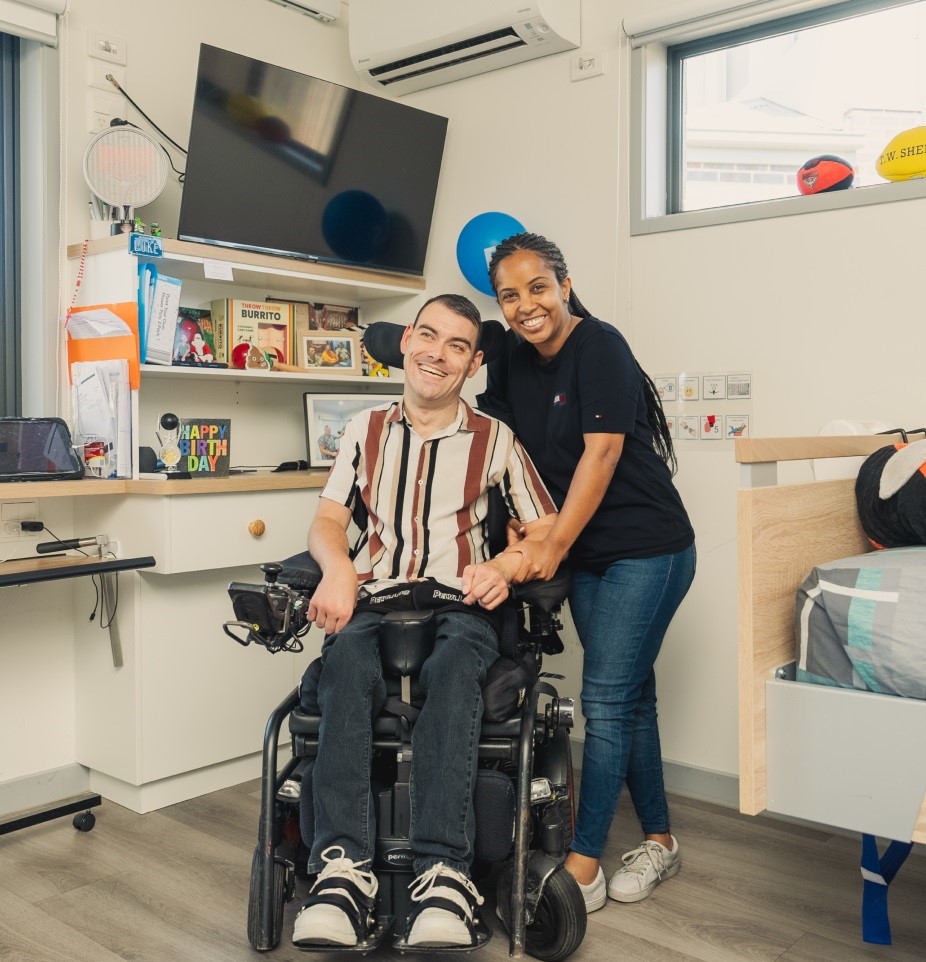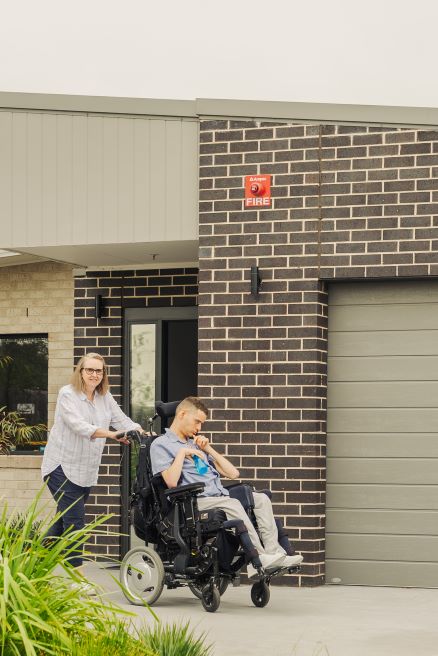For newcomers to the NDIS, finding the right Support Worker can be nerve-wracking.
Most individuals and families we work with do not like having people that feel like strangers come into their homes.
We know that finding trustworthy Support Workers can be time-consuming and at times, frustrating. So that is why we have asked our Service Delivery team for their tips on choosing the right Support Workers. Here are their top five tips.

1. They are a good match for your Life & Personality
We believe you should look for someone who has a good attitude, similar interests and will be a good team fit (particularly if they are part of a team of support workers). You need to get along with your support worker, someone you can relate to and enjoy spending time with.
CPSN member, Astrid, has been an NDIS recipient for six years and using support workers during her adult life has given her an appreciation of what does and does not make for a good lifestyle fit. Astrid is an open-minded individual and explains that her support workers "shouldn't be racist, misogynist or homophobic."
Astrid currently has two regular workers with whom she and her husband have a wonderful relationship. She says she is looking for someone she has a really good connection with. "Even though they're there to help you when you go out, it's still better to feel like you're going out with a mate rather than a nurse."
CPSN client Tash also explains that having someone in her house and just getting one-word answers to everything is awkward. "I don't want to sit in silence, especially if it's over an hour." It is important that you can have great conversations with your support worker, who is also a good personality fit.
2. They support you to be Independent
We believe support workers should know when to provide the support you've asked for and when to let you do your own thing.
Before the NDIS rollout, Astrid dealt with council support workers who failed to support her to be independent. Even something as small as taking a shower was often a micro-managed task. Astrid explains, "I like a hot shower, but the support worker would say no, that's too hot." Astrid would have to insist.
Tash also looks for someone who respects her autonomy but is willing to provide support when she needs it. A great worker will ask what you want support with and never assume you can't do something. For example, they should not act on your behalf and talk to people for you (unless you've communicated or requested that). More than anything else, you want someone who will respect your privacy and support your NDIS goals while upholding your dignity.
3. The Support Worker is employed via a Registered Provider
If you decide to engage a registered support worker, you'll have peace of mind that your support worker is employed via registered provider, rather than an independent provider.
This means the organisation has gone through rigorous audits by the NDIS, to ensure the services that they offer and provide you are all meeting their quality and safety standards.
Other things are also looked at very closely such as
- Accountability
- Quality standards:
- Trained staff
Professional and expert high quality support options including things such as
Vetted Staff :
Registered providers handle recruitment, vetting, and onboarding of staff, giving you peace of mind.
Expertise:
Staff are often well-versed in the nuances of the NDIS, helping participants navigate the system and understand their plan benefits.
Specialist services:
Registered providers can offer access to specialist services like Occupational Therapy, Physiotherapy, or Counseling.
Continuity of care:
There are consistent, reliable continuity of care plans and support in place, even when a worker is unavailable. They manage staff schedules and replacements.
Robust support systems:
Registered providers have established systems for managing services, including regular check-ins and a clear process for addressing issues or concerns.
Accountability for staff:
Providers hold their staff accountable for things like tardiness and absenteeism.
Reduced administrative burden:
If you choose a registered provider, this means you don't have to handle tasks like direct employment, payroll, or finding replacements.
Professional relationships:
All feedback is handled professionally and confidentially, providing a layer of security for participants.
4. They know the value of Communication
Your support worker should know Communication is key to a great working relationship. They should listen to you closely and confirm they have understood what you have communicated. There needs to be open Communication around setting clear expectations for both clients and support workers.
Sometimes boundaries can be overstepped or blurred. For example, clients and support workers may have each other's phone numbers and may send messages or call them anytime, so sometimes this becomes inappropriate, especially when calls or messages are frequent during the night or early mornings and not related to the support or services.
Our Service Delivery team says that this is where a service agreement and our Safe Support and Shared Outcomes programs come in handy.
It is always a great idea to formally set expectations in writing so your support worker knows what you want support with and what they're comfortable with. If you're unsure, it is always best to have a direct conversation about what is okay or not. This is also something our Client Liaison Coordinator (CLC) is more than happy to guide and support you with when having those conversations.
5. They have a willingness to learn and receive feedback
There can be conflicts and concerns in any relationship; one key quality to look for is a positive attitude to learn and receive feedback. We know that every individual and family can have different expectations around safety and professionalism, so we encourage you to create a safe space for the support worker to learn with you at each shift.
We also recommend avoiding support workers with poor attitudes or values that don't align with your own, as this may mean an inability to empathise, adapt and grow.
One of the benefits of having your Client Liaison Coordinator with CPSN is having a third party assist you with any concerns. Especially if you do not feel comfortable talking to the person yourself or vice versa, they can help resolve it and escalate it to management when required. CPSN must ensure the safety of our clients. You must raise any concerns or issues when they arise, no matter how small.
6. They have Disability Experience and/or Training support
One of the pitfalls we noticed with our clients' experience with support workers is a lack of knowledge and training on professional and safe conduct. At CPSN, we offer Disability training courses and the introduction of programs such as Safe Support and Shared Outcomes.
These collaborative programs help the client (and family), support workers and Client Liaison Coordinators work professionally and safely. They also set clear expectations in a supportive way to address concerns if either party is not upholding what was agreed to.
We also try to ensure that our support workers respect the client's values as it is key to a strong, long-lasting relationship between the participant and the support worker. So we work very hard to include our clients in the recruitment process, from bringing your network through, to participating in interviews.
The role of a Disability support worker is to support people to achieve their goals. Whether you are looking for a support worker or thinking of starting a career as a support worker, it is important to understand what makes a great worker.
Curious to know more about our Support Worker and client matching program?
With over 20 years of experience, we understand that clients want long-term relationships with their support workers. We know people want choice and control when it comes to finding support workers, so we created the unique support worker best fit match program.
We pioneered the option to employ people you already know and trust. So, if you do not want to hire a stranger, we can work with you to recruit someone from your networks or our community to work with you. We can work closely with you to match your likes, dislikes and interests with them.
Alternatively, you can 'Bring-Your-Own' support worker to work with us and our team.
Once you have selected your support worker, we take care of all the Employment obligations, giving you time to focus on you and your life. We will assist with training and managing the day-to-day requirements.
All you need to do is choose the days, hours, and type of support you want.
We let you to choose who you want to be part of your life and provide the support that you want when you want it.
Below is a video of how we select our support workers
https://youtu.be/bL4UOgnLB2E?si=muEi3AH0HDHy8dfw
Interested in learning more about becoming a client with us?
Call (03) 9478 1001 or visit our Individual Supports page
Or are you interested in becoming a Support Worker with us? Find out more about our job openings
CPSN




